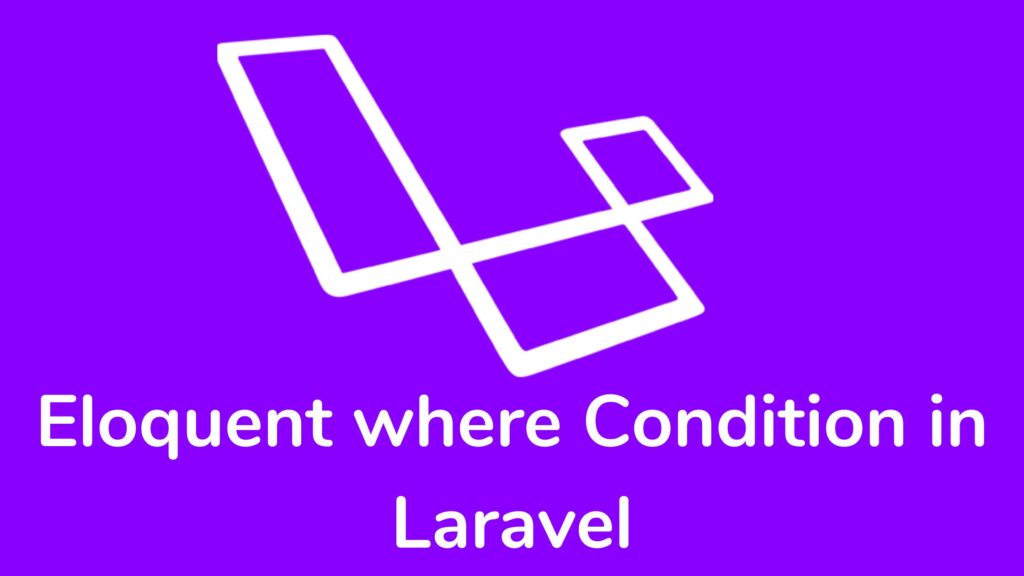Your cart is currently empty!
Mastering the Eloquent where Condition in Laravel

Hi Guys,
Laravel’s Eloquent ORM (Object-Relational Mapping) is one of its standout features, offering a robust and expressive way to interact with your database. One essential functionality Eloquent provides is the method, that allows developers to filter queries efficiently and intuitively. In this article, we will delve deep into the where condition, exploring its various forms and practical use cases.
Basic Usage of where
The where method is used to add basic constraints to database queries. Here’s a simple example:
$users = User::where('status', 'active')->get();In this example, we are retrieving all users where the status column is active.
Syntax
The basic syntax of the where method is:
Model::where('column', 'operator', 'value');column: The name of the column.operator: The comparison operator (e.g.,=,>,<,>=,<=,!=). If omitted,=is assumed.value: The value to compare the column against.
Examples
Using Default Operator =:
$products = Product::where('category', 'Electronics')->get();Using Custom Operator:
$expensiveProducts = Product::where('price', '>', 1000)->get();Combining Multiple where Clauses
You can chain multiple where clauses to refine your queries further:
$products = Product::where('category', 'Electronics')
->where('price', '<', 1000)
->get();This query fetches all electronic products priced below $1000.
Using where with Arrays
To simplify multiple conditions, you can pass an array to the where method:
$products = Product::where([
['category', '=', 'Electronics'],
['price', '<', 1000]
])->get();This array-based approach enhances readability and maintainability, especially with several conditions.
Advanced where Conditions
whereIn and whereNotIn
For filtering records where a column’s value is within a set of values, use whereIn:
$users = User::whereIn('role', ['admin', 'editor', 'author'])->get();Conversely, whereNotIn excludes records matching a set of values:
$users = User::whereNotIn('role', ['guest', 'subscriber'])->get();whereNull and whereNotNull
These methods are useful for checking NULL values:
$usersWithoutEmail = User::whereNull('email')->get();
$usersWithEmail = User::whereNotNull('email')->get();whereBetween and whereNotBetween
For range queries, whereBetween is particularly handy:
$products = Product::whereBetween('price', [100, 500])->get();To exclude a range, use whereNotBetween:
$products = Product::whereNotBetween('price', [100, 500])->get();whereDate, whereMonth, whereYear, whereDay
Eloquent also offers methods to filter records based on date components:
$todayUsers = User::whereDate('created_at', Carbon::today())->get();
$mayUsers = User::whereMonth('created_at', 5)->get();
$year2021Users = User::whereYear('created_at', 2021)->get();Raw Expressions
For more complex queries, you can use raw expressions:
$users = User::whereRaw('DATEDIFF(now(), created_at) <= ?', [30])->get();This example fetches users created within the last 30 days.
Combining Multiple Conditions
To combine multiple conditions with different logical operators, use closures with where:
$products = Product::where('category', 'Electronics')
->where(function($query) {
$query->where('price', '<', 1000)
->orWhere('discount', '>', 20);
})->get();Here, we retrieve electronic products priced below $1000 or have a discount greater than 20%.
Now your user will easily connect to your application. Do you want to check which mail tools are best for your application? Click Here. If you have questions, please leave a comment and I will respond as soon as possible.
You can check developer tools on the Supertools website. Please give me feedback on this website.
Conclusion
The where method in Laravel Eloquent is a powerful tool for querying databases with precision and clarity. From basic filtering to advanced conditions, it offers a comprehensive suite of options to handle a wide range of query requirements. By mastering these functionalities, developers can leverage the full potential of Eloquent to build efficient and maintainable applications. Whether you’re dealing with simple queries or complex datasets, Eloquent’s where condition provides the flexibility and power to retrieve the data you need.

